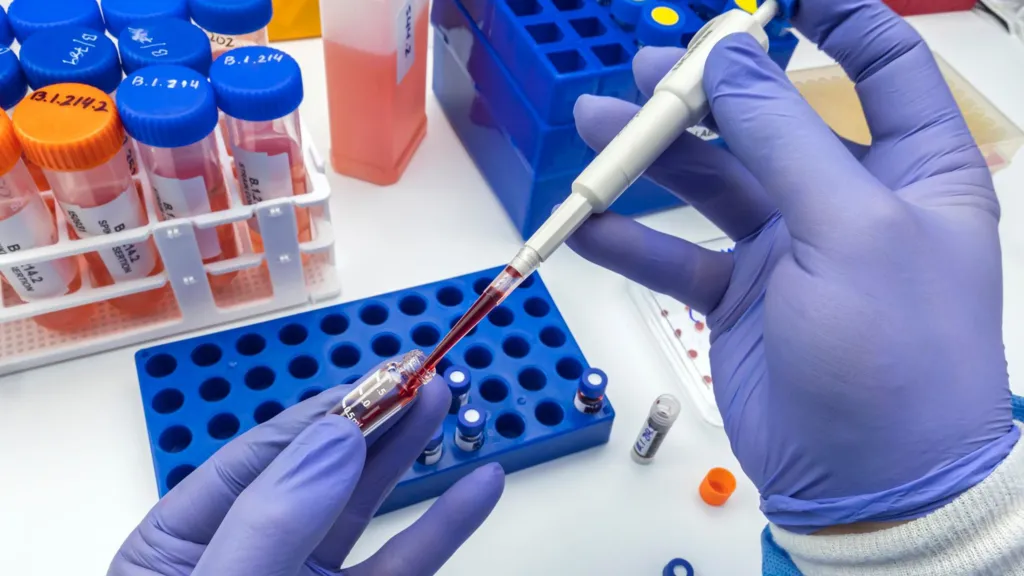An NHS service provider that obtained a £2 billion agreement to supply blood-testing services for doctors and hospitals is reportedly experiencing difficulties in delivering consistent results, as highlighted by medical experts.
Synnovis, a collaboration between the healthcare firm Synlab and the Guy’s and St Thomas’ and King’s College hospital foundation trusts, was awarded the contract in 2021 to manage pathology services for nearly 200 GP practices in south-east London.
Interviews with GPs by the BBC reveal that inconsistencies and delays in blood test outcomes have become a frequent issue, leading to considerable anxiety for patients and healthcare providers alike.
In response, Synnovis expressed its deep regret for the disruption and distress caused to those impacted.
The company, which suffered a ransomware attack in June 2024 that delayed over 1,000 NHS surgeries, explained that the incident had “significantly diminished our ability to process samples.” Serving six hospitals in London, Synnovis emphasized that it had committed all available resources to providing clinically safe and mostly manual temporary solutions.
Feedback from more than a dozen GPs across south-east London’s boroughs indicates that the serious obstacles presented by Synnovis are generating unease among both patients and doctors.
The GPs informed the BBC that issues with blood tests are leading to unnecessary hospital referrals and wasted appointments. An example provided involved an elderly man who, while caring for his wife with dementia, spent several hours in A&E unnecessarily due to blood test complications.
One anonymous GP remarked, “It would have never crossed our minds before that a blood test could be unreliable. Now, it’s a daily worry.”
They added, “The troubles with Synnovis represent nothing less than an extraordinary national embarrassment.”
Kemi, a 17-year-old college student, began experiencing symptoms such as heart palpitations, shortness of breath, and fatigue six months ago.
Due to her health issues preventing her from attending college, she sought a blood test at her GP surgery, which utilizes Synnovis for analyzing samples. When the results were received, she was informed there was an issue: “My potassium was reported as too high, which is not normal,” she noted.
However, her GP later clarified that her potassium levels were indeed normal; the erroneous result occurred because her blood sample had coagulated due to a prolonged wait for processing. Her results on the NHS app, which the BBC reviewed, indicated they were “invalid due to laboratory error.” Kemi expressed that this situation has left her feeling “frustrated, sad, and confused.”
“I’m really in a tough spot. I’m feeling depressed and anxious about what might happen to me before I get a diagnosis,” she shared. “I’m worried I could end up in serious danger without a proper diagnosis.”
GPs confided in the BBC that unreliable blood test results, including falsely elevated potassium levels from processing delays, have been common since Synnovis took over their services. Elevated potassium levels can indicate severe health risks, including heart complications.
Consequently, GPs state they cannot disregard blood test results showing high potassium, even if suspected erroneous, and must promptly refer patients to A&E.
These patients are often sent home after being retested at the hospital, where their potassium levels return to normal.
Dr. Shah—name changed for anonymity—indicated that he faces this situation weekly.
“If potassium levels exceed six, it can lead to harmful heart issues and arrhythmias that could potentially be fatal,” Dr. Shah explained. “This necessitates immediate retesting to ensure the validity of the results.”
Having practiced as a GP for nearly thirty years, Dr. Shah mentioned a notable rise in elevated potassium results at his practice in recent years.
“It turned out there were delays in collecting samples from GP practices, as well as processing delays at the labs, which caused misleading test results,” he stated.
He recounted needing to send an elderly patient to the hospital due to elevated potassium levels indicated by a Synnovis blood test. The man had arrived at the surgery accompanied by his wife, who has dementia, and his daughter, and they were anxious about potential long wait times in A&E that evening.
“I had to advise them not to wait until the next day, even though I believed the results were normal,” Dr. Shah relayed. At the hospital, the patient’s potassium level was confirmed to be normal, allowing him to go home.
Dr. Shah remarked, “I’m likely sending several patients to A&E weekly based on results I suspect may be inaccurate. Since Synnovis took control of pathology services for this region, it’s been an ongoing series of failures.”
“We’re basically left second-guessing the pathology system—something that was unheard of before.”
“When you visit a shoe store, you expect to leave with a pair of shoes; when using a pathology service, you expect precision and dependability. This expectation has not been met.”
Dr. Shah is not alone in expressing these concerns.
Multiple claims from the 14 GPs interviewed, all wishing to remain anonymous for their professional safety, reveal a troubling pattern.
One GP noted that the added workload from handling unreliable results has contributed to “higher burnout rates and a desire among staff to leave the field.”
Several GPs elaborated on recent instances where they were delayed in conducting timely diabetes tests because of Synnovis issues.
Londonwide LMCs, which represents and supports GPs throughout the city, confirmed that the blood-test delays and inaccuracies faced by practitioners in south-east London are not reflective of the pathology services in other London areas.
“We have received an unprecedented number of emails and inquiries, aside from during the early days of Covid, concerning one particular issue from one specific area in London,” remarked Michelle Drage, CEO of Londonwide LMCs.
“This is a frequent occurrence on a clinic-by-clinic basis,” she added.
Recognizing the toll these issues have taken on GP morale and workloads, Dr. Drage stated, “We no longer believe we can depend on Synnovis for precision. Our practitioners have lost faith in that service—it’s a troubling situation.”
In October, the Londonwide LMCs escalated their concerns to the Southeast London Integrated Care Board, responsible for overseeing the NHS hospital trusts collaborating with Synnovis.
Dr. Drage described the written response received as “unsatisfactory.”
In addition to gathering doctors’ accounts, the BBC reviewed numerous emails sent by Synnovis to GPs from 2021 to the present, apologizing and explaining various pathology issues, including those related to malaria and diabetes test results.
One communication revealed Synnovis apologizing for a backlog of 70,000 test results in the spring of 2024—prior to the cyberattack.
Dr. Jayne—name changed for anonymity—stated that it took Synnovis a month to identify and begin rectifying the backlog. “It’s really difficult to grasp the magnitude of the problem… 70,000 concerns,” said the GP, who has worked for nearly 20 years.
“It’s incredibly stressful. We strive to safeguard our patients. I feel like I’m perpetually apologizing for a faulty system. This isn’t my fault. We genuinely want to conduct our work effectively instead of managing Synnovis’s mistakes.”
The Southeast London Integrated Care Board acknowledged in a statement that GP-ordered tests alone total around 10,000 daily, involving various logistical steps from blood collection to reporting results.
The statement also revealed that several incidents affecting the Synnovis service have been driven by various factors, including events beyond their control.
It continued: “One of these incidents was a criminal cyberattack, which necessitated an extraordinary effort from multiple partners, including Synnovis, to sustain a viable service for our GP counterparts while Synnovis undertook the substantial task of reconstructing their systems.”
According to a statement from NHS England in October, 10,152 outpatient appointments and 1,710 elective procedures were canceled due to the cyberattack.
Their statement indicated that “the recovery process following the cyberattack on pathology service provider Synnovis in June is nearing completion, meaning nearly all services are now operational again.”
In its statement, Synnovis reported that it conducts over 6,000 different types of tests, catering to nearly two million patients, six hospitals, and 191 GP practices across 249 locations.
“While we recognize that even a single error can lead to distress for patients and practitioners, erroneous Synnovis tests make up significantly less than 0.001% of the 150,000 tests we carry out daily.”
However, these data may encompass all Synnovis testing, including urine tests.
In its statement, Synnovis added, “The provision of Synnovis’s pathology services for GPs relies on a variety of test-request and results systems and software—many of which existed before the Synnovis contract and are supplied by legacy third parties.
“We fully understand that this period has been tremendously challenging and at times distressing for patients and frontline NHS personnel, and we sincerely apologize for any inconvenience and distress experienced by those affected.”
For college student Kemi, the recent events have eroded her trust in the healthcare system.
She remarked, “I feel that as a young person, the inability to obtain reliable results indicates that I cannot pursue an independent health journey as a 17-year-old. It’s uncertain where to go from here.
“It may seem trivial, just a blood test, but it’s significant. It could mean the difference between life and death.”

